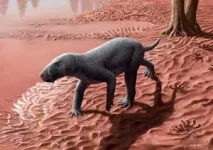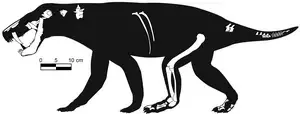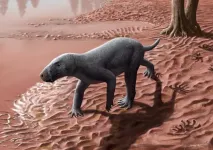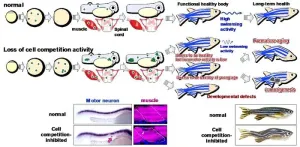Described in Mallorca the world's oldest ancestor of mammals
2024-12-17
(Press-News.org)
Gorgonopsians are an extinct group of synapsids that lived during the Permian, between 270 and 250 million years ago. They belong to the evolutionary lineage that would give rise to the first mammals 50 million years later. They were warm-blooded animals like modern mammals, but, unlike most of them, they laid eggs. They were carnivorous and were the first animals to develop the characteristic saber teeth. They were often the superpredators of the ecosystems in which they lived, and their appearance would be similar to a dog, but without ears or fur.
The remains recovered in Mallorca belong to a small to medium-sized animal, approximately one meter in length, and come from a site located in the municipality of Banyalbufar (Serra de Tramuntana, Mallorca, Spain). Excavations were carried out in three different campaigns during which a large quantity of material was recovered. “The large number of bone remains is surprising. We have found everything from fragments of skull, vertebrae, and ribs to a very well-preserved femur. In fact, when we started this excavation, we never thought we would find so many remains of an animal of this type in Mallorca,” explains Rafel Matamales, curator of the Museu Balear de Ciències Naturals (MUCBO | MBCN) and research associate at the Institut Català de Paleontologia Miquel Crusafont (ICP), and first author of the article.
Its location of the specimen in the Balearic Islands is an unusual fact in itself. The known remains of gorgonopsians prior to this discovery belonged to very high latitudes such as Russia or South Africa. Its age has also surprised the researchers who conducted the study. “It is probably the oldest gorgonopsian on the planet. The one we found in Mallorca is at least 270 million years old, and the other records of this group worldwide are, at the very least, slightly younger,” points Josep Fortuny, senior author of the article and leader of the Computational Biomechanics and Evolution of Life History research group at the ICP.
Among the excavated fossil remains, a nearly complete leg stands out, which has allowed researchers to study how the animal moved. Unlike reptiles, which have a more ancestral locomotion with their legs more spread out, gorgonopsians had their legs positioned more vertically and, therefore, moved in a way that was intermediate between reptiles and mammals. This system is more efficient for walking and especially for running. The recovered saber teeth confirm its diet. “We know that this is a carnivorous animal, a characteristic shared by all gorgonopsians worldwide. The saber teeth are a common feature in large predators of ecosystems, and what we have found was likely one in the environment in which it lived,” emphasizes Àngel Galobart, researcher at the ICP and director of the Museu de la Conca Dellà.
When Mallorca Was Not an Island
During the Permian, approximately 270 million years ago, Mallorca was not an island but was part of the supercontinent Pangaea. It was located at an equatorial latitude, where countries like Congo or Guinea can be found today. The climate was monsoonal, alternating between wet and very dry seasons. It has been found that the site where the fossils were found was a floodplain with temporary ponds where gorgonopsians and other fauna drank. Among the animals that cohabited in this ecosystem were moradisaurine captorhinids, an ancient group of herbivorous reptiles to which the Tramuntanasaurus tiai belongs, which may have been part of the gorgonopsians' diet.
Despite the small area that occupy, the Balearic Islands have an exceptional fossil record. The most studied and well-known fossils are from the Pleistocene and Holocene. However, the fossil record from other periods is considerably less known. Nonetheless, remarkable fossils have been found, such as the world's oldest mosquito, nearly a thousand species of ammonoids (cephalopods related to squids), ancestors of horses and hippos, giant sharks, and large coral reefs.
In addition to Matamales, Fortuny, and Galobart, the study also involved Eudald Mujal, researcher at the Staatliches Museum für Naturkunde Stuttgart (Germany), Tiago Simões, from the Princeton University (USA), Christian Kammerer from the North Carolina Museum of Natural Sciences (USA), and Kenneth Angielczyk from the Field Museum of Natural History (USA). The study has been supported by the project "Mallorca abans dels dinosaures: estudi dels ecosistemes continentals del Permià i Triàsic amb especial èmfasi en les restes de vertebrats" from the Institut Català de Paleontologia Miquel Crusafont (ICP) and funded by the Departament de Cultura i Patrimoni (Consell Insular de Mallorca) and the CERCA program of the Generalitat de Catalunya.
END
ELSE PRESS RELEASES FROM THIS DATE:
2024-12-17
The first true mammals evolved roughly 200 million years ago, during the early days of the dinosaurs. But mammals are the last surviving members of an older group, called the therapsids. At first glance, many therapsids weren’t obviously mammal-like , but they also had subtle features that we recognize in mammals today, like a hole on the sides of their skull for the jaw muscle to attach and structures on their jaw bones that would eventually evolve into mammals' distinctive middle ear bones. In a new paper in the journal Nature Communications, scientists announce the discovery of a fossil therapsid ...
2024-12-17
Researchers have used a chemical compound to light up treatment-resistant cancers on imaging scans, in a breakthrough that could help medical professionals better target and treat cancer.
The authors at King’s College London say that using the radiotracer – an injected compound used in PET scans – could help inform doctors that a patients aggressive cancer will not respond to chemotherapy before treatment is given. This would prevent the patients receiving unnecessary treatment and provide them with alternative options that will give them the best chance of beating the disease.
The ...
2024-12-17
Osaka, Japan – From the very moment an egg is fertilized, life begins with a remarkable process: cells start dividing and replicating to make copies of themselves. Yet this process is not flawless. Errors can occur when genetic material is copied, creating “unfit” cells that don’t work properly. To keep development on track, cells employ a fascinating quality control system called cell competition. However, much about this mechanism remains unclear.
Now, in a study recently published in Nature ...
2024-12-17
Researchers in Japan have demonstrated the high accuracy of their newly developed typhoon observation device, which is designed to drop from an aircraft into the eye of a typhoon. The results were published in the journal Scientific Online Letters on the Atmosphere (SOLA).
Dropped from aircraft, the dropsonde, a small, single-use instrument, measures and transmits atmospheric data, including temperature, humidity, and wind speed, as it falls. The new dropsonde, iMDS-17, weighs only 130 grams and is made mainly of a biodegradable ...
2024-12-17
The ICOD (Improving Condition in Down syndrome) project, a pioneering study in addressing the cognitive difficulties associated with Down syndrome, has demonstrated the safety of treatment with the molecule AEF0217, developed by the French biotech Aelis Farma, as well as its effectiveness in improving cognitive function in these people. The study was led by the Research Institute of the Hospital del Mar.
This phase of the trial (phase 1/2 of the project), funded by the European Union under the Horizon 2020 R+D programme and Aelis Farma, has been carried out with 29 people with Down syndrome between 18 and ...
2024-12-17
Although demand for mental health treatment remains high, administrative and financial barriers are preventing many psychologists from participating in insurance networks, according to the American Psychological Association’s 2024 Practitioner Pulse Survey. Barriers by many insurance companies can make it more difficult for psychologists to remain in-network and for patients to access the care they need, exacerbating the ongoing mental health crisis.
This annual survey, which was conducted among 853 psychologists in September 2024, by APA and its companion organization APA Services ...
2024-12-17
SAN BERNARDINO, California, USA, 17 December 2024 - In a compelling Genomic Press Interview, Editor-in-Chief Dr. Julio Licinio reveals how a children's book about a lonely color has shaped the innovative vision of scientific publisher Genomic Press. The story of Flicts, penned by renowned Brazilian artist Ziraldo Alves Pinto, has become more than just a brand element – it represents a revolutionary approach to academic publishing.
"Sometimes the ideas that don't fit anywhere else are precisely the ones that help us reach the stars," explains Dr. Licinio, highlighting the publisher's mission to support ...
2024-12-17
CHARLESTON, South Carolina, USA, 17 December 2024 - In a comprehensive Genomic Press Interview published today in Brain Medicine, renowned neuroscientist Dr. Peter Kalivas reveals crucial insights into how brain circuits drive addictive behaviors and discusses potential new drug targets for treating behavioral disorders.
Dr. Kalivas, Distinguished University Professor at the Medical University of South Carolina, has transformed our understanding of addiction neuroscience through his pioneering work on the tetrapartite synapse - a complex cellular structure that includes neurons, astroglia, and the extracellular matrix. His ...
2024-12-17
PHILADELPHIA, Pennsylvania, USA, 17 December 2024 - In a comprehensive Genomic Press Interview, Dr. Munir Gunes Kutlu, Assistant Professor at Temple University's Center for Substance Abuse Research, unveils revolutionary findings about how our brains process fundamental learning calculations and social interactions.
"Our research has identified specific neural mechanisms that transform sensory inputs into behavioral outputs," says Dr. Kutlu. "We've discovered that the brain's dopamine system works in more sophisticated ways than previously understood, particularly in how it processes information about environmental cues and rewards."
The interview, published ...
2024-12-17
ATLANTA, Georgia, USA, 17 December 2024 - In a comprehensive Genomic Press Interview with researchers from Emory University, a new study published today reveals complex attitudes toward psychedelic therapy, with detailed statistics showing both strong support for potential benefits and significant awareness of risks.
The research, published in the journal Psychedelics, surveyed 178 attendees at an academic conference focused on psychedelics and spiritual care. Among participants, 32 were active psychedelic ...
LAST 30 PRESS RELEASES:
[Press-News.org] Described in Mallorca the world's oldest ancestor of mammals









